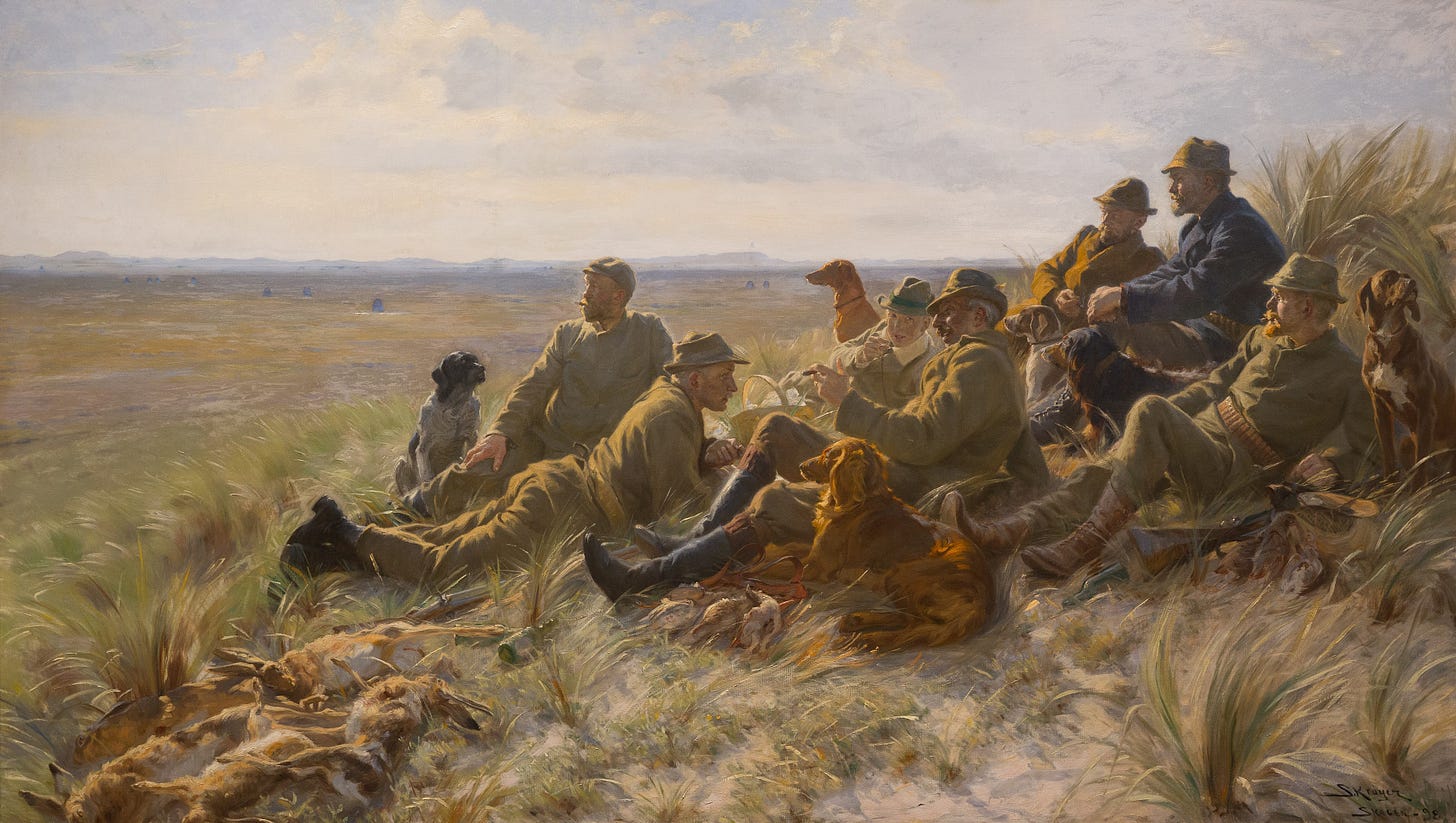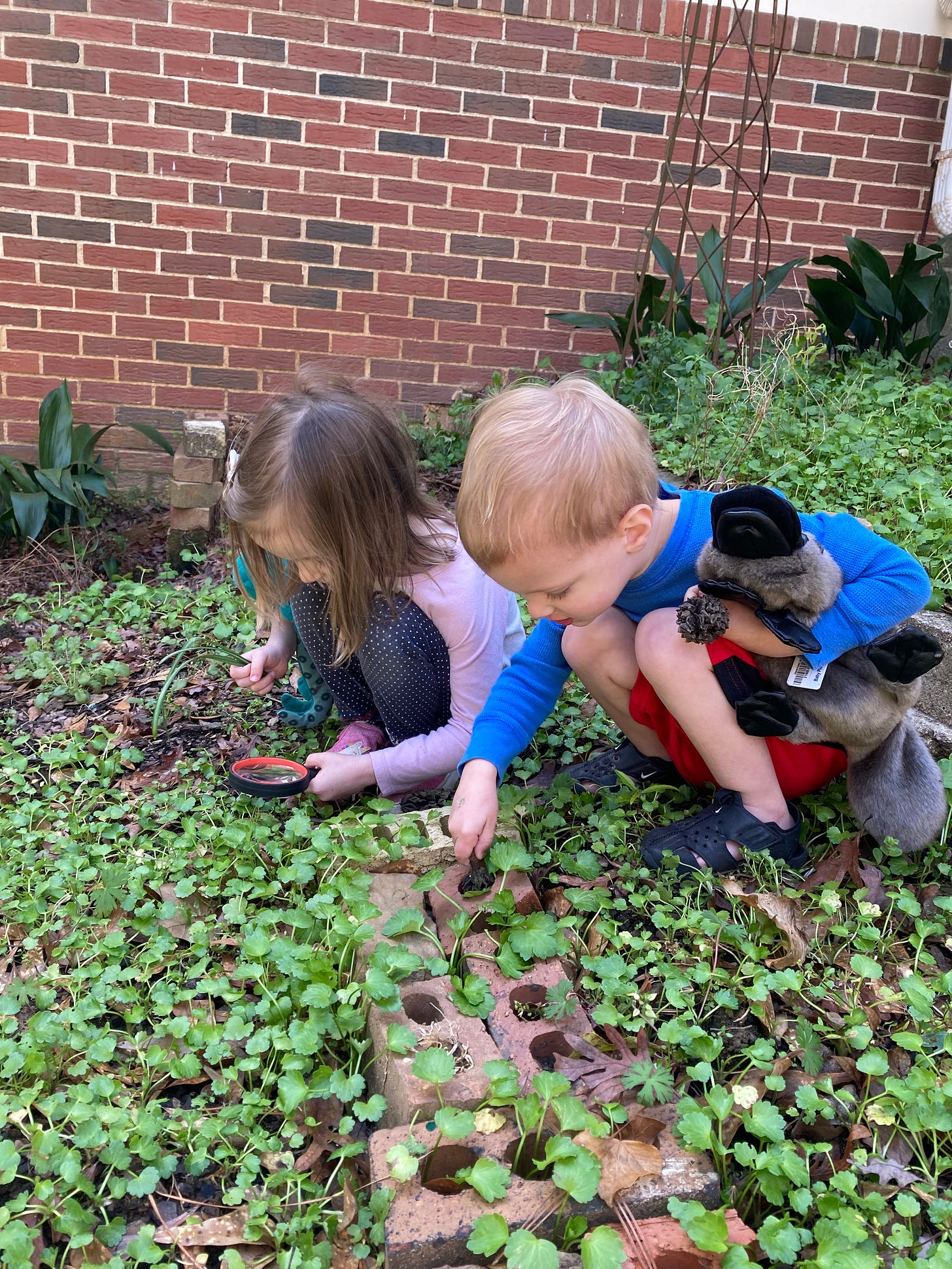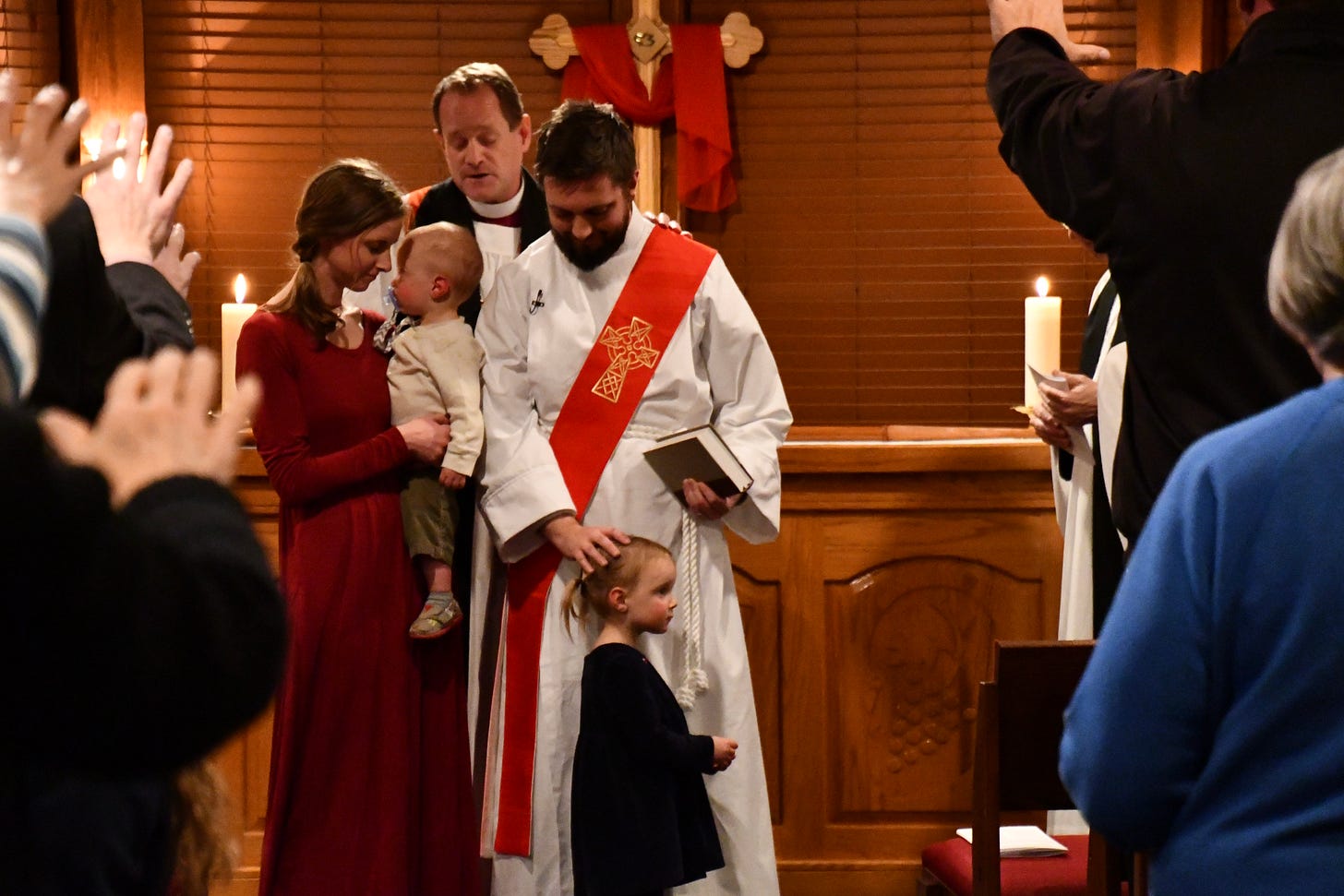A Mid-Lent Update from the Clemmons, on Mission
Rachel Weeping, A Sheep Silent, S4, News of the World, SpringScenes
Dear friends and family,
Grace to you and peace from God our Father and the Lord Jesus Christ.
I’m writing this a couple hours before we walk out the door to attend our parish’s Mid-Lenten Soup Supper. We are approximately 20 days (give or take) through the 40-day fast, and I’m very much looking forward to marking the time with the comforting accoutrement of fellowship and food. “Comforting” in the good, old, 16th-century sense, of course, where to “comfort” is act closer to “strengthening” than “consoling.”
Every Lent—that traditional season for confession, repentance, ascesis, and renewed commitment to all that good and true and beautiful (viz. the Lord God)—I am confronted in unexpected ways by my own weaknesses, doubts, vices, fears, and disobediences—by my sin. I know that any time spent intentionally praying, confessing, and self-denying will create an unwieldy internal churn that will settle out in discomfiting and disturbing revelations, but I never know quite what they’ll be.
This year, fear and loathing seem to be towards the fore. God has been rather unpleasantly showing me both how many things I fear losing and also how graceless and impatient and angry I can be toward the things and people who have been given me. In the words of young Sally Brown, “All I want is what’s coming to me, all I want is my fair share,” failing to reckon, of course, with what my actual “fair share” would be in a just judgment (spoiler: deprivation, abandonment, wrath). This selfishness, this deepworn lack of trust in God’s goodness and providential care is precisely the opposite orientation a believer can and should have towards our faithful Lord. But what can we do, when we’re fearful, angry, unwilling or unable to trust our lives and our flourishing, our present and our future, to God?
We can—and should!—turn to the testimony of Scripture, and hold up to our remembrance and contemplation the revelation of a trustworthy, steadfast, faithful God.
About which, my study this morning of Jeremiah 31:15-17 had a doozy of an answer, one I simply must share. There are still thoughts in progress, so don’t, say, build an entire theology on them. But my mind was reeling at the intricate beauty of God’s work this morning, and I thought these reflections might be, comforting.
Jeremiah 31 forms part of that deep-breather in what is a generally downer, dour book (in a good way!). This deep-breather is often called the Book of Consolation, a set of prophecies where our God reaffirms his promises of restoration, even in the midst of judgments he carries out against the rebellious, idolatrous people he has claimed for his own. (You can find these promises of restoration in Deuteronomy 30:1-10, before they start poping up all over the rest of the Old Testament.)
Jeremiah 31:15 opens with a familiar scene for Jeremiah: someone weeping in lamentation. This time, it’s not a stricken soldier or a desperate refugee; it’s Rachel. Beloved wife of Jacob, mother of Joseph and Benjamin. She’s weeping (posthumously, somewhere in the God’s hearing) for her children. She’s weeping for Israel, for Judah, for the peoples of the Northern and Southern Kingdoms, for all those cast into exile for their sin. Like Jacob at the presumed death of Joseph, she refuses to be comforted. Her voice wails, her tears flow. She is disconsolate, inconsolable.
Thus says the Lord:
“A voice is heard in Ramah,
lamentation and bitter weeping.
Rachel is weeping for her children;
she refuses to be comforted for her children,
because they are no more.”
God responds. And tells her to stop up her wailing. To dry her tears. It’s rather insensitive, at first glance.
Thus says the Lord:
“Keep your voice from weeping,
and your eyes from tears,
for there is a reward for your work,
declares the Lord,
and they shall come back from the land of the enemy.
But this is not a repudiation of lament; it’s not a call to stoicism and the stiff upper lip. Instead, God affirms that—because there is “a reward for her work,” because there is a genuinely just recompense—there is yet hope. Rachel’s children—the ones who were no more—shall come back from the land of the enemy. If Rachel refuses to be comforted, she won’t hear the healing of God, which He works in holy silence.
This is where things get interesting.
Rachel’s name is cognate to Hebrew word for “sheep” or “ewe” (this is the Rachel, after all, whom Jacob first meets as she leads a flock of sheep). That same word (רָחֵל, ‘rachel’) appears only a few times in Scripture, most importantly in Isaiah 53:7:
He was oppressed, and he was afflicted,
yet he opened not his mouth;
like a lamb that is led to the slaughter,
and like a sheep (רָחֵל, ‘rachel’) that before its shearers is silent,
so he opened not his mouth.
The Gospels identify this lamb led to the slaughter as Jesus, the incarnate Son of God, who, in the face of accusation and condemnation, remained silent (cf. Mt 26:63-66, 27:12-14; John 19:19). Jesus is the ‘Rachel’ who keeps silence, and who suffers to bring his people back from the land of the enemy.
While Rachel sees only the judgment, the deprivation, and the loss of her children, God sees the fullness of his work, and that it will surely result in restoration. Rachel’s children shall return from the enemy’s land. They shall be built and planted securely. But if she is to exercise hope, she needs to keep from weeping, for a while.
Our wailing must fall silent if we will hear God’s mighty work, our tear-bleared eyes must be cleared to see that work clearly, and only then will we be turned to joy, laughter, and merriment.
Rachel's voice, bitterly crying before Yahweh, provokes his response. Jesus, the suffering servant, is the sheep (the ‘Rachel,’ רָחֵל) that before its shearers is silent, and opens not his mouth.
And when he does this, going down unto death, the reward for his work is that God’s people can return from the land of the enemy (death).
This is a God who can be trusted, who restores, who in the silence of his suffering turns our lamentation unto joy.
I expect this will be the last update before Eastertide and the end of the semester, just given the several boatloads of tasks to be accomplished before then.
Peace of Christ,
Zack
S4
I am in the absolute thick of the semester. Major papers loom, projects which promise to test and exceed my capabilities. That’s in addition to the usual gamut of things: daily assignments, endless reading, meals to cook, a church to clean, prayers to pray, services at church, people with whom to meet, correspondence I’ve left neglected (if I you an email or phone call—and I owe many of you—please forgive me), a wife whom I want to see from time and time, and who probably wants to see me, those three children. I confess to feeling rather overwhelmed the past few days. But I remain aware, in my better moments, that all this work is good work, and more importantly, is the work that God has given me to do now.
I recently re-listened to The Screwtape Letters, and particularly enjoyed that section where Lewis writes about time. Tempters love nothing more than to keep us living in any time but the one over which we actually have some measure of agency. Namely, the present. To live in the past is to live with regret, despair, nostalgia. To live in the future is to not live at all, to sacrifice the present to an endless array of idols. Today is the day of salvation, the present is the only time in which we can obey or disobey, work virtue or vice, love or hate. And today, there’s work to do.

My Jeremiah class continues to be a highlight. It’s a lot of work, digging in the Hebrew text, paying constant and careful attention to all of that inner connections within the book. As with all deep study of the Bible, I am regularly amazed, astounded, inspired, made joyful at the richness of the Scriptures. In Jeremiah, I’ve seen God is a judge—even our judge, the judge of his people—and his judgments are not light. But his judgments are always unto restoration, are always unto the recapturing of his people’s heart. He is a judge who is also a loving father, a faithful and longsuffering husband. Like Moses in Deuteronomy, and like Jesus in the Gospels, Jeremiah speaks eloquently and frequently to the necessity of giving over to God our whole hearts.
My Evangelism & Church Planting class leaves much to be desired, but I’m grateful that God is using it to convict my heart and renew my spirit unto public witness for his glory and goodness. I’m definitely one of those for whom evangelism has always been a low priority, something that I know is integral to the life of discipleship, but feels rather more like a chore and rather less like the overflow of the heart from which the mouth speaks. And I still think many of the available models for evangelism—the ones which we think of most readily as evangelism—tend towards reductionism, a thinning out of the gospel, interested more in moments of crisis than lifelong discipleship.
Nevertheless, the facts remain: the gospel is good news, and people are sinners separate from God. We have been sent by our Lord Jesus into the world to carry out his ministry, to bear his kingdom. I’ve been grateful to begin planning an evangelism and service ministry at our church with some truly devoted believers.
My parish ministry docket remains similarly full: The Sunday school class on Malachi wrapped up at the end of February (in seven weeks, we made it through Malachi 2, haha). I filled in for the youth Sunday school with a quick lesson on typology, the regulative principle, and Lent. The Hall of Men continues apace (recent Heroes of the Hall include St. Cyril of Jerusalem and St. Patrick). I enjoyed some bonding time over Scripture, prayer, pizza, and worst-job stories with the Central Alabama Deanery (our small network of churches in AL and MS). And I was honored to serve in two funerals in the past two weeks.
I’ve organized an arts ministry event—“Where is that fire which once descended? The Work of the Sprit in the World”—that I’m über-excited about (read about it here). And, of course, Holy Week approacheth. I’m slated to preach on Palm Sunday, which I’m most eager for. It’s a massive service—the palm-processional, the dramatized Passion reading, the dense typology of Jesus’ ascent to Jerusalem—so I covet your prayers as I prepare.

News of the World
Clemmons Studio continues to grow, experiment, take commissions, and churn out good work. That is, Erin is doing those things. I’m impressed each week with the work she puts in and the work she produces. Her first ceramics classes have, by all accounts, gone well. I’ve enjoyed tending to the kids while her students slowly realize just how hard it is to make good pottery. The work that Erin does it as good as it is as the fruit of countless hours of practice.
Her work has also become a key part of our family’s income in this season, not least so that we can qualify for/afford certain kinds of health insurance.
(sidenote: for those of you who have supported or continue to support us financially in this seminary season, we remain eternally grateful. If you’re content supporting us through PayPal, I’m not looking to rock your boat. That said, the best way to support us financially this year has actually changed a bit: now, instead of donating through the PayPal, you can purchasing a subscription through Clemmons Studio. The income through her official business helps us qualify for certain tax credits. As an extra benefit, you’ll also receive pottery!)
Erin also successfully completed her second half-marathon just a couple weeks ago, the Montgomery Half. Now she’s eyeing her next running challenge: a trail half, or the full marathon? Time will tell.
Spring has arrived in Birmingham, which means pleasant days, massive storms, a partial basement flood (mercifully partial this time), and, more importantly, gardening season! Erin has her growlight bench set up, the bed-prep has begun, and we eagerly await the germination of dozens of seedlings she’s begun. We have big plans; here’s hoping the local deer coöperate.
Eleanor, Ames, and Virgil are all generally loving life. A brutal sickness put a damper on our Spring Break, but they still enjoyed a trip to Mimi’s, lots of outside time, and the usual agenda of trips to the library, zoo, and church. Last night they had their Spring Program at the day school they attend a few days a week, and I’m not ashamed I grew a little teary watching Eleanor sing along and dance to Steven Curtis Chapman’s “Great Adventure.” Great adventure, indeed.
SpringScenes
Picture from Birmingham, AL and Montgomery, AL, February-March 2022.
Status Board
Reading: As a much-needed respite from school reading (which is all great, just weighty and ponderous), I was grateful to read through James Rebanks’ Pastoral Song (published in England as English Pastoral: An Inheritance). It’s gorgeous pastoral writing, an earthy, healthy view of life on earth in a place. It’s rather less good in its political vein, but it only sometime ventures out into that. I mean, he’s unimpeachably correct in most of his political commitments, but is entirely too sanguine about the possibility of “policies” and “public investment” to effect change in our patterns of production and consumption.
Listening: I’ve always been finicky about audiobooks—I can only do non-fiction, and only in shorter form (it can’t exceed 8 hours), preferably essays. Fiction, longer form works, dense history—these just don’t work for me in that medium. I finally realized a few weeks ago that C.S. Lewis and G.K. Chesterton are perfect in audiobook format. I’ve already listened through The Screwtape Letters and am halfway into Letters to Malcolm: Chiefly on Prayer.
Watching: Will hooked me up with access to Kogonada’s sophomore feature, After Yang. His debut film, Columbus, is in my top-five of all-time. After Yang is a pensive, sometimes brooding film about the human experience. I didn’t love it as much as Columbus, but I will say with total confidence now that Kogonada has a visual sense for the truth. His montages are always profound, often sublime, Malick-like but in the immanent rather than transcendent key.
Food & Drink: Since starting this newsletter this afternoon, we’ve gone and returned from that mid-Lent soup supper. And folks, I’m please to report that that potato soup was comforting.
Prayer Requests
The best way to support us is to join with the Son in remembering us before the Father. If you’d like to pray with and for us, here are some things you can remember:
that the Lord would strengthen us to observe a holy Lent, to root out our vices and feast on his goodness
that Zack would have time and energy to complete his papers and, more importantly, prepare to preach Palm Sunday
that Erin’s would continue to be energized by her artistic and business endeavours
that we would get to have dinner with some new neighbors this month
that God would sustain us through the semester in health and diligence
that Eleanor would find confidence and joy in friendships
that Ames would be relieved of his lingering cough
that Virgil would continue to grow healthy and strong
that God would go before us to begin preparing our post-seminary ministry
We’d also like to pray with and for you! If you’re reading this, you’re probably already in our prayers, but we’d love to know more specifically what we can pray for. You can text us, of course, or you can email us prayer requests at clemmonsonmission@gmail.com
We’re the Clemmons family–-Zack, Erin, Eleanor, Ames & Virgil–-living & studying & working in Birmingham, Alabama for sake of God’s Kingdom.
If you’d like, you can support us financially by ordering a Clemmons Studio subscription, as we navigate this season on mission, with part-time income.
If you’re receiving this, it’s because you’re signed up for our newsletter.
If you’re not yet subscribed, you can do so by clicking below!
If you know someone who might like to read our little missives, share the newsletter with the button below!














